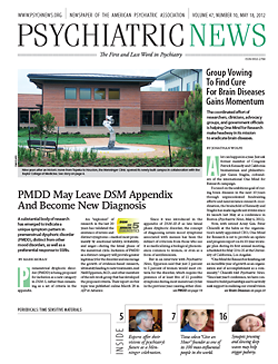Neupro Approved for Advanced Parkinson’s Disease
On April 3, UCB announced the approval by the Food and Drug Administration (FDA) of Neupro (rotigotine transdermal system) for treatment of the signs and symptoms of advanced-stage idiopathic Parkinson’s disease (PD) and as a treatment for moderate-to-severe primary restless legs syndrome (RLS). Neupro was previously approved for early-stage idiopathic PD.
Neupro is a dopamine agonist patch that provides continuous drug delivery. Although the precise mechanism of action of Neupro as a treatment for PD and RLS is unknown, it is thought to be related to its ability to stimulate dopamine receptors.
In three trials, statistically significant improvements in the combined scores on the Unified Parkinson’s Disease Rating Scale (UPDRS) were observed in early-stage PD patients receiving Neupro compared with patients receiving placebo. The three trials measured only the activities of daily-living and motor-performance sections of the UPDRS. Two trials of Neupro in patients with advanced PD examined change from baseline in “off” time, periods when the effectiveness of medication wears off and PD symptoms return. Statistically significant changes in off times were observed in advanced PD patients receiving Neupro compared with those on placebo.
The efficacy of Neupro in the treatment of RLS was primarily evaluated in two fixed-dose, randomized, double-blind, placebo-controlled trials with six-month maintenance periods. Patients received Neupro doses ranging from 0.5 mg/24 hours to 3 mg/24 hours, or placebo, once daily. Statistically significant improvements in sum scores on the International RLS Rating Scale and the Clinical Global Impression–Improvement (CGI-I) assessment were observed in RLS patients receiving Neupro compared with those receiving placebo.
UCB said that Neupro will be available in U.S. retail pharmacies in July.
AstraZeneca and Targacept Announce Failure of TC-5214
AstraZeneca and Targacept have announced results from the remaining phase 3 studies of TC-5214 as an adjunct therapy to an antidepressant in patients with major depressive disorder (MDD). The studies did not meet the primary endpoint of change on the Montgomery-Asberg Depression Rating Scale total score after eight weeks of adjunct treatment with TC-5214, compared with placebo. TC-5214 was generally well tolerated, with an adverse-event profile consistent with that found in prior clinical trials. The companies said they will not pursue a regulatory filing for TC-5214 as an adjunct treatment for patients with MDD.
Jury Finds Johnson and Johnson Guilty in Risperdal Case
Johnson & Johnson (J&J) “lied to patients and doctors because they cared more about profits than people” in making claims about the company’s second-generation antipsychotic Risperdal (risperidone) , said Arkansas Attorney General Dustin McDaniel in April, after a jury found the company guilty after 10 days of testimony. The jury determined that J&J downplayed and hid risks associated with the drug, which has been linked to increased risk of stroke and death in elderly dementia patients and to seizures, weight gain, and diabetes.
After the jury decision, Arkansas Circuit Court Judge Tim Fox issued a penalty of $1.19 billion for nearly 240,000 violations of the state’s Medicaid fraud law. The New York Times reported that he also fined the company $11 million for violations of the Arkansas Deceptive Trade Practices Act.
This is the latest case regarding fraudulent claims about Risperdal. A South Carolina judge previously upheld a $327 million civil penalty against J&J, found guilty by a jury in March 2011 of overstating the safety and effectiveness of Risperdal (Psychiatric News, January 20).
FDA Clarifies Dosing and Warnings for Celexa
The FDA issued an announcement March 28 to clarify dosing and warning recommendations for the antidepressant citalopram. In August 2011, the FDA issued a Drug Safety Communication stating that citalopram should no longer be used at doses greater than 40 mg/day because it could cause potentially dangerous abnormalities in the heart’s electrical activity. Citalopram use at any dose is discouraged in patients with certain conditions due to risk of QT prolongation. However, since it may be important for some of those patients to use citalopram, the drug label has been changed to describe the caution needed when citalopram is used in such patients. The revised label also advises that the maximum recommended dose of citalopram should be 20 mg/day for patients who have hepatic impairment, are over age 60, are CYP 2C19 poor metabolizers, or are taking concomitant cimetidine (Tagamet) or another CYP2C19 inhibitor. These factors lead to increased blood levels of citalopram, increasing risk of QT interval prolongation and Torsade de Pointes.
Zoloft Lawsuit Remains In State Court
A lawsuit against Pfizer was filed in February in St. Louis Circuit Court on behalf of 21 children born with defects after their mothers took Pfizer’s Zoloft (sertraline) while pregnant.
The suit states that SSRI antidepressants have been found to cause severe birth defects in the children of women who were prescribed the drug while pregnant and alleges that Pfizer knew or should have known that children born to mothers who had taken SSRI antidepressants during pregnancy had a greater risk of congenital birth defects. Despite that knowledge, Pfizer failed to adequately warn the medical community and the public of the danger of prescribing Zoloft to women of childbearing age, the plaintiffs allege.
The lawsuit accuses Pfizer of negligence; negligence of pharmacovigilance, which requires Pfizer to monitor safety data for its drugs; strict liability; negligent design; failure to warn; and fraud.
In March, Pfizer attempted to move the case from state to federal court, alleging that diversity of citizenship existed between the plaintiffs and the defendant. Diversity of citizenship occurs when opposing parties in a lawsuit are citizens of different states or of a foreign country. The lawyers representing the plaintiffs opposed the effort, and on April 4, U.S. District Judge Carol Jackson sided with the plaintiffs and sent the case back to the state court for further proceedings.


